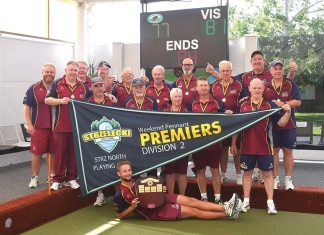Jeeralang Junction’s Stephen Inger “loves everything” about wheelchair basketball.
When he was introduced to the sport 12 years ago, he had “never even heard of it”.
“I was taking my son to training at Morwell, and there was a wheelchair squad practicing,” he said.
“The people in the office said I should give it a go, but I thought I wouldn’t be able to do it because I wasn’t in a wheelchair. “I probably wouldn’t have thought of it anyway, because I don’t think of myself as disabled.”
The below-knee amputee has been involved in the Traralgon wheelchair basketball program ever since, and passionately advocates the benefits of participating.
“We train in Traralgon on Thursdays and play about five or six country tournaments a year,” he said.
“There are about six regulars, including able-bodied people who just want to give it a go.
“I think there’s a lot of potential for more involvement down here, if there are people ready and willing to give it a go.”Disability Sport and Recreation’s sport and recreation coodinator Tim Nield said the organisation was trying to increase participation in the Traralgon program.
“The aim is to provide a recreational opportunity for people in the Gippsland area,” Nield said.
“We’ve got a coach and the equipment like sports wheelchairs including different sizes, so all people need to do is sign up and be able to get to training.”
Nield said out of all the wheelchair sports on offer, basketball had the highest participation rate.
“Wheelchair basketball is pretty easy to learn, and the team environment also appeals to a lot of people,” he said.
“Also the fact equipment is provided makes it relatively cheap compared to other sports.”
Inger reinforced the reasonably small participation costs, estimating the cost of chair and court hire for six months around $90 per person, and entry fees to the tournaments around $130 per team.
While Inger enjoys the physical side of wheelchair basketball, it is the spirit in which the game is played that attracts him most.
“It is the only sport I know where the opposition will help you get back on the court if you’ve damaged your chair or yourself,” he said.
“I’ve never seen any other sport do that at the local level, even in the juniors.”
Such is Inger’s passion for the sport that every Tuesday for the past six years, he has travelled to Melbourne with his son to play in a weekly competition.
“I love the competition, and the feeling of being on the court,” he said. “There are able-bodied people who play as well, and also people who are less physically capable that others.
“The point is anyone who can push a wheelchair can have a go.”
For more information phone Tim Nield on 9473 0133 or email tim@dsr.org.au











